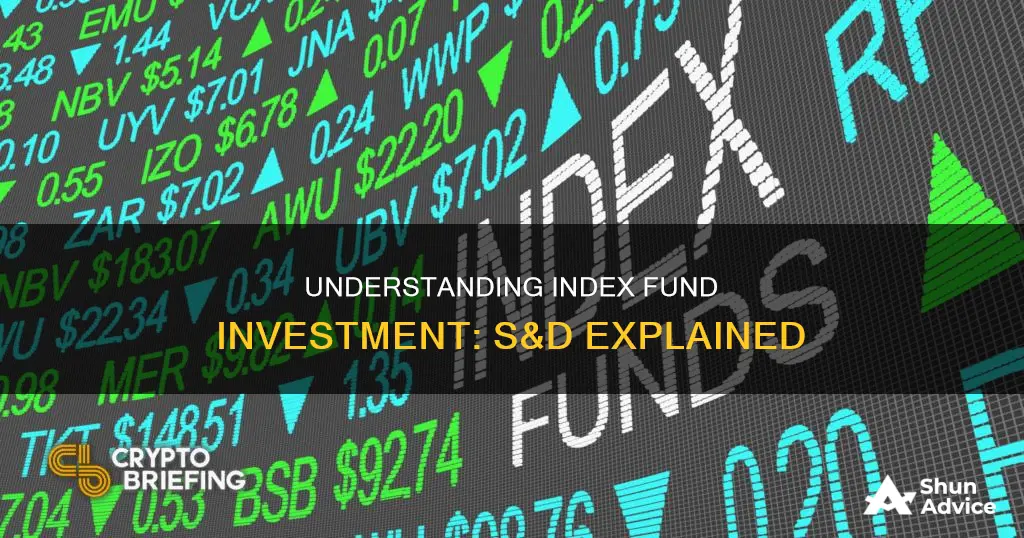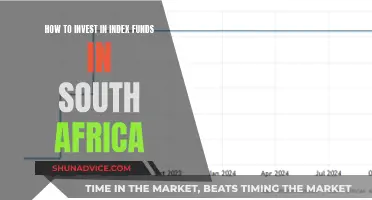
Index funds are a type of investment fund, either a mutual fund or an exchange-traded fund (ETF), that tracks the performance of a market index, such as the S&P 500. Index funds are passively managed, meaning they aim to mirror the composition and performance of a financial market index by holding the same stocks or bonds. This means they are not actively managed, so they don't require research analysts or incur transaction fees and commissions. As a result, they have lower fees than actively managed funds. Index funds are considered a safe, low-cost, and easy way to build wealth, making them a popular choice for investors, especially beginners.
| Characteristics | Values |
|---|---|
| Type of fund | Mutual fund or exchange-traded fund (ETF) |
| Investment strategy | Passive |
| Holdings | Stocks, bonds or a combination of both |
| Management | Not actively managed; fund managers buy all or a representative sample of the stocks or bonds in the index it tracks |
| Risk | Lower risk due to broader diversification |
| Taxes | More tax-efficient than actively managed funds |
| Expenses | Lower expenses and fees than actively managed funds |
| Performance | Historically, many index funds have outperformed actively managed funds |
| Accessibility | Accessible to regular investors |
What You'll Learn

What are index funds?
Index funds are a type of investment fund, either a mutual fund or an exchange-traded fund (ETF), that is based on a preset basket of stocks or an index. An index is a collection of stocks (or bonds) and an index fund mimics the composition of the index instead of trying to pick which stocks will perform the best. Therefore, index funds are passively managed investments, only adjusting their holdings when the underlying index changes.
Index funds are typically created around a specific theme. For example, there are indexes for companies based on their geographic location, size, sector, or whether they pay dividends. An index might also consist only of bonds or bonds of a certain quality and duration.
Index funds are designed to replicate the performance of financial market indexes, like the S&P 500, and are ideal for long-term investing, such as retirement accounts. They are a popular choice for investors seeking low-cost, diversified, and passive investments that tend to outperform many higher-fee, actively traded funds.
Index funds are considered a passive management strategy because they don't need to actively decide which investments to buy or sell. They are often used to help balance the risk in an investor's portfolio, as market swings tend to be less volatile across an index compared to individual stocks.
Index funds have become one of the most popular ways for Americans to invest due to their ease of use, diversity, and returns that typically beat actively managed accounts.
A Smart Guide to Investing in DFA Funds
You may want to see also

How do they work?
Index funds are a type of investment fund that can be set up as either a mutual fund or an exchange-traded fund (ETF). They are passively managed, meaning they aim to replicate the performance of a particular market index, such as the S&P 500, by holding the same stocks or bonds as the index or a representative sample of them.
Index funds are designed to be a low-cost, simple, and effective way to build wealth over the long term. They are passively managed, meaning they don't require a team of analysts and portfolio managers to decide which investments to buy or sell. This passive management strategy means that index funds have lower fees than actively managed funds.
Index funds are typically diversified across a variety of asset classes, sectors, and industries, which can help to reduce risk for investors. The performance of an index fund will depend on the performance of the index it tracks.
- Have a goal: Before investing in index funds, it's important to know what you want to achieve. Index funds are generally used for long-term wealth building, particularly for retirement.
- Research different types of index funds: Index funds can be based on various factors, including company size, geography, business sector, asset type, and market opportunities.
- Pick your index funds: When choosing an index fund, cost is a key consideration. Index funds are cheap to run, but administrative costs can vary, so be sure to compare expense ratios.
- Decide where to buy your index funds: You can purchase index funds directly from a mutual fund company or a brokerage. If you want to buy ETFs, you will need to go through a broker. When deciding where to buy, consider factors such as fund selection, convenience, trading costs, and impact investing.
- Open an investment account: To purchase shares of an index fund, you'll need an investment account, such as a brokerage account, individual retirement account (IRA), or Roth IRA.
- Buy the index fund: You can then buy the fund through your investment account. You may be able to select a fixed dollar amount to spend or choose a number of shares to purchase.
- Keep an eye on your index funds: Index funds are passive investments, but it's important to monitor their performance to ensure they are tracking their underlying index as expected.
Overall, index funds are a popular investment choice due to their low cost, diversification benefits, and ability to match market performance over the long term.
Investments Funding Social Security: State-Sponsored Retirement Plans
You may want to see also

Are they good for beginners?
Index funds are an excellent option for beginners stepping into the investment world. They are a simple, cost-effective way to hold a broad range of stocks or bonds that mimic a specific benchmark index, meaning they are diversified.
Index funds are a type of mutual or exchange-traded fund (ETF) that tracks the performance of a market index, such as the S&P 500, by holding the same stocks or bonds or a representative sample of them. They are defined as investments that mirror the performance of benchmarks like the S&P 500 by mimicking their makeup.
Index funds are passively managed, which means they have lower expense ratios than most actively managed funds. They are also very popular among investors because they offer a simple, no-fuss way to gain exposure to a broad, diversified portfolio at a low cost.
Index funds are a great way to get exposure to the stock market without excessive fees or dependence on the performance of individual stocks. They are a good option for beginners to get started with investing, but they can also serve as a core of any stock portfolio, regardless of the investor's level of experience.
- Low costs: Index funds have some of the lowest expense ratios on the market. Even if you don't select the cheapest fund, you can still expect to get the performance of the index minus the expense ratio and any other fees you're paying.
- Diversification: Index funds allow you to hold a stake in hundreds of stocks, even if you only own one share of the fund. This broad collection of companies lowers your risk through diversification.
- Solid performance: Your returns will effectively match the performance of the index, which has historically been about 10% annually on average over long periods.
- Easy to buy: It's much simpler to invest in index funds than it is to buy individual stocks, as it requires little time and no investing expertise.
- News coverage: If your fund is tied to a leading index like the S&P 500 or Nasdaq Composite, you'll see a lot of news coverage, which can help you keep abreast of your investment while learning the broader market's ebbs and flows.
In summary, index funds are a great option for beginners because they are simple, cost-effective, and diversified, with solid historical performance. They are a good way to get exposure to the stock market and can serve as a core of a stock portfolio for investors of any level.
A Guide to Investing in MIP Mutual Funds
You may want to see also

How much does it cost?
The cost of investing in index funds varies depending on the fund and your broker's policies. Some index funds have a minimum investment amount, which can range from nothing to a few thousand dollars. There may also be an account minimum with your broker, which is different from the investment minimum.
When investing in index funds, there are a few costs to consider. If your index fund has no minimum, you can usually purchase any dollar amount. If there is a minimum, you must purchase at least that amount. Index funds also typically have an expense ratio, which is an annual fee expressed as a percentage of your investment and covers the fund's expenses. For example, if you invest $100 and the fund has an expense ratio of 0.04%, you will pay an annual fee of $0.04. Be sure to review the fund's fees and performance before investing.
If you are investing in an index fund in the form of an exchange-traded fund (ETF), there may be additional costs. ETFs trade like stocks and have a share price. Depending on your broker, you may need to pay the full share price or you may be able to buy fractional shares for any dollar amount. ETFs may also have an expense ratio, so be sure to consider the fees involved.
Overall, index funds are known for being a low-cost investment option, with many funds having expense ratios of less than 0.20%. Some funds, like the Fidelity ZERO Large Cap Index Fund, have no expense ratio at all. When choosing an index fund, it is important to consider the fund's costs as they can impact your total return.
Li Lu Fund: Investing in the Next Big Thing
You may want to see also

Are they safer than stocks?
Index funds are generally considered safer than stocks because of their diversification benefits. Index funds track a specific market index, such as the S&P 500, meaning they contain a broad range of stocks across various sectors. This diversification lowers the risk of investing by ensuring that if a single company performs poorly, it will have a minimal impact on the overall fund.
For example, the S&P 500 index fund includes 500 of the top companies in the United States, so if one company out of those 500 performs poorly, the impact on the fund is minimal. This is in contrast to investing in individual stocks, where a poor-performing company can have a significant impact on your portfolio.
Index funds are passively managed, meaning they aim to replicate the performance of a specific market index. As a result, they have lower fees than actively managed funds, as they don't require analysts to choose stocks or time trades. This makes them a more cost-effective option for investors.
Additionally, index funds are simple and don't require a lot of expertise or time to invest in. They are also tax-efficient, as they don't generate as many capital gains distributions as actively managed funds due to their lower turnover rates.
However, it's important to note that index funds are not without their drawbacks. One of the main criticisms is their lack of flexibility. Since they are designed to mirror a specific market, they decline in value when the market does, and they cannot pivot to other strategies when the market shifts. They also lack downside protection, meaning that if the market performs poorly, the index fund will as well.
In summary, while index funds offer diversification, lower fees, simplicity, and tax efficiency, they may not be suitable for everyone due to their lack of flexibility and downside protection. When considering whether to invest in index funds or stocks, it's important to understand your financial goals, risk tolerance, and investment horizon.
Large-Cap Funds: A Smart Investment for Your Money
You may want to see also
Frequently asked questions
An S&P 500 index fund is an investment fund that tracks the performance of the Standard & Poor’s 500 index, which is made up of 500 of the largest U.S. public companies.
S&P 500 index funds are popular with investors because they offer ownership of a wide variety of stocks, greater diversification, lower risk, and attractive returns, all at a low cost.
You can invest in an S&P 500 index fund by purchasing shares through a brokerage account, an individual retirement account (IRA), or a Roth IRA. You can also buy directly from a mutual fund company or a brokerage.
The costs of investing in an S&P 500 index fund include the expense ratio, which is an annual fee charged by the fund manager, and the sales load or commission. It's important to compare the fees of different funds to find the most cost-effective option.
Some recommended S&P 500 index funds include the SPDR S&P 500 ETF Trust (SPY), Vanguard S&P 500 ETF (VOO), iShares Core S&P 500 ETF (IVV), Fidelity 500 Index Fund (FXAIX), and Schwab S&P 500 Index Fund (SWPPX).







